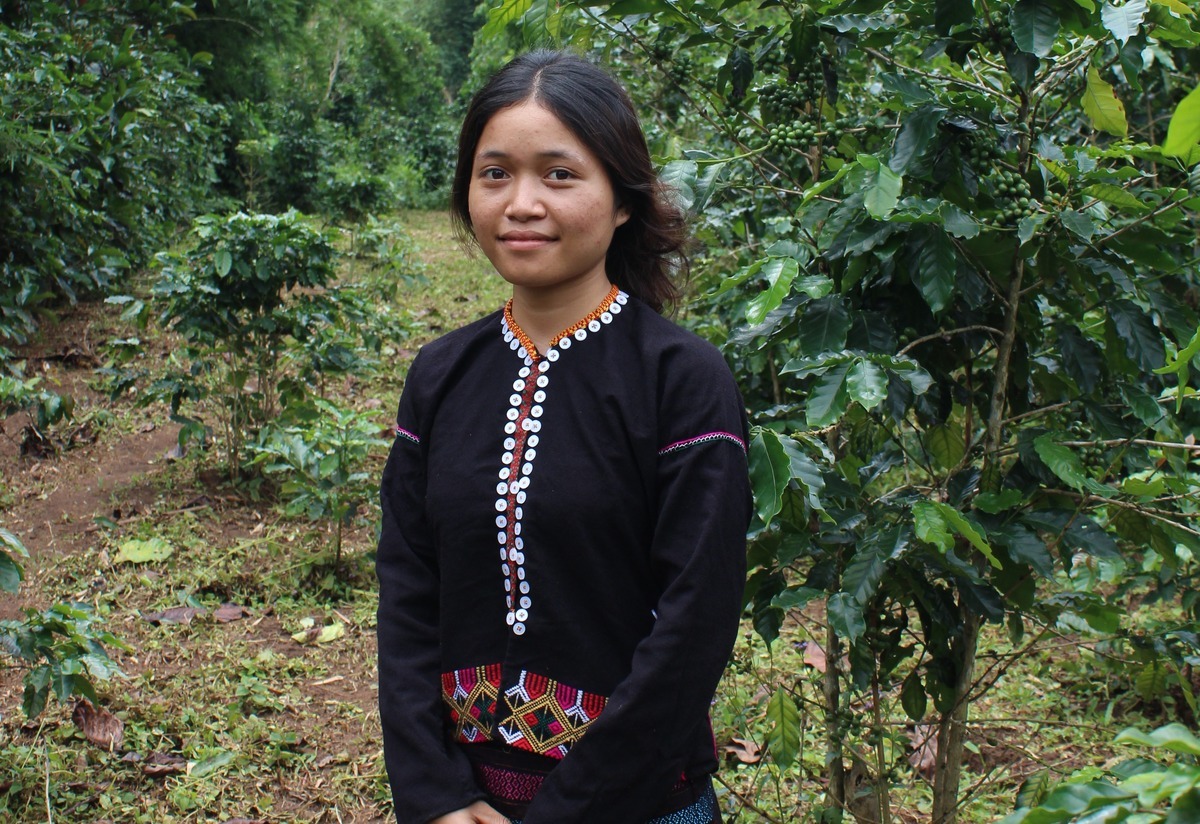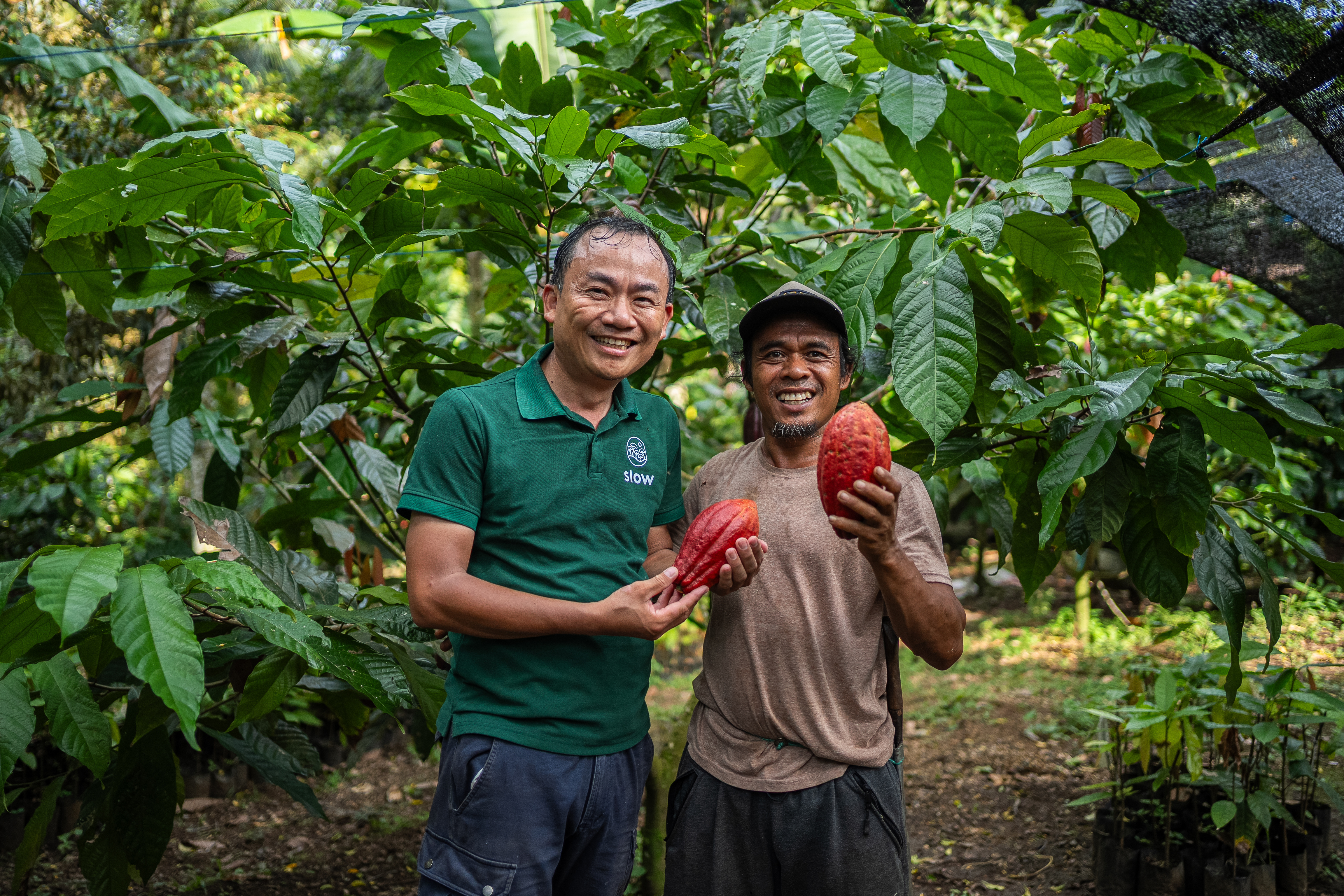What happens when coffee meets a forest?
Climate pressures are rising. In one Vietnamese coffee region, farmers are turning to agroforestry to secure yields, restore soils, and keep supply...
Sep 27, 2024 - 2 min read

Planting cover crops to restore the land and prevent landslides. © Slow
This province in central Vietnam is home to nearly 4,000 hectares of Arabica coffee farms, providing a lifeline for thousands, including many from the Bru-Van Kieu ethnic minority. For farmers in Huong Hoa district, coffee represents 73% of their total income, according to Slow’s June 2024 assessment.
But the farming system is caught in a vicious cycle. Depleted soils lead to reduced yields, which force farmers to clear more land, worsening soil degradation and increasing their vulnerability to climate impacts. One local farmer, Ho Van Quyet, recalls how heavy rains devastated his best farmland. “It was my best land,” he shares. “It's heartbreaking to see it go.”
“My family had to borrow food and money from neighbors all that year,” said Quyet.
Stories like Quyet’s are becoming more common as market pressures push farmers to unsustainable monoculture practices, trapping them in a cycle of rising costs, declining yields and growing debt.
Over the past two years, Slow, WWF Vietnam and WWF Finland have been working with farmers in Quang Tri to test a new approach: regenerative agroforestry.
-1.jpeg?width=1200&height=800&name=Study%20tour%20to%20Slow%20Laos%20(1)-1.jpeg)
Quang Tri farmers on a study tour to learn sustainable coffee farming practices at Slow’s farm in Laos © Slow
Regenerative agroforestry is a system that blends trees into coffee farms, mimicking the balance found in natural ecosystems. The idea is simple but powerful: by planting trees among the coffee crops, the soil becomes healthier, biodiversity increases and farmers gain protection against the increasingly unpredictable climate.
A group of 356 smallholder farmers in Quang Tri, funded by Danida Green Business Partnership (DGBP) under the Prosperous Farmers and Forests Partnership, have begun this transition. This community-corporate, partnership, led by Slow and WWF, aims to build sustainable, resilient and inclusive forest economies in Vietnam.
These farmers, who are living on incomes below the national average, are receiving training and financial support to plant the right shade trees. Many of them lacked the resources and knowledge to make this change on their own.
Of course, the shift to agroforestry isn’t without its challenge. The process takes time, and resources are limited. To address this, the project organised consultation workshops in mid-2024 with experts and farmers to help select the best tree species for the farms and offer more financial backing.

Farmers onboard regenerative farming to restore their land in Quang Tri © Slow
What makes this project even more significant is its potential to contribute to global efforts against biodiversity loss. A recent study has warned that by 2070, human activity could disrupt over 50% of Earth’s wildlife habitats. But regenerative agroforestry provides a solution that allows farming to coexist with nature, preserving ecosystems rather than depleting them.
Quang Tri’s coffee farms lie between two key nature reserves, Huong Hoa and Dakrong, making sustainable farming in this area even more critical. By adopting agroforestry, farmers not only improve their own crop yields but also help protect the rich biodiversity surrounding their farms.
Sabrina Mustopo, COO of Slow, highlights the importance of involving smallholder farmers in this shift. “Vietnam’s large population of smallholder farmers makes them a crucial part of restoring our ecosystem,” she notes. Agroforestry practices, such as intercropping, can substantially enhance the resilience of coffee farms by diversifying income sources and mitigating the risks posed by economic and climate challenges.
Additionally, Slow has introduced a floor pricing mechanism with premiums to ensure farmers get fair prices for their coffee. This financial stability encourages them to continue with sustainable practices, improving their livelihoods in the long term.
What’s happening in Quang Tri could serve as a model for other coffee-growing regions, offering a way to revitalize the coffee industry while protecting the environment. Could this blend of farming and forests be the key to a more sustainable future for coffee?

Climate pressures are rising. In one Vietnamese coffee region, farmers are turning to agroforestry to secure yields, restore soils, and keep supply...

Earth Day reminds us that change doesn't have to wait for sweeping policy or perfect systems. Often, it starts with something as simple—and as...

Big news from Slow. African Coffee Roasters is now part of the Slow family. And this isn’t just an acquisition—it’s a major step forward in how...